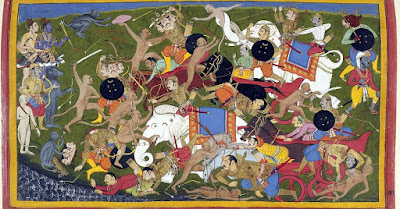A HOUSE FOR MR. BISWAS- A FEW POINTS AND QUOTES
A HOUSE FOR MR.BISWAS deals with a theme of deeper
significance, the theme of selfhood where an individual quests for identity and
struggles to acquire a personal place for which the “house” stands as an
evocative symbol all through. It traces the story of a man’s struggle to make
something out of a circumscribed and mediocre existence. The concluding lines
of the ‘Prologue’ to the novel sum up, in a nutshell, what the novel is
actually about: “How terrible it would have been at this time, to be without it…to
have lived and died as one had been born, unnecessary and unaccommodated.” The
words very clearly suggests that the ‘House’ becomes a symbol of order and
identity. It affirms the importance of such values as independence,
individuality, creativity and a degree of freedom from human complicity. The possibility of acquiring a personal
space in the New World is suggestive of a fragile hope.
The protagonist, Mr. Biswas’s task in the novel happens to
be to create something of his own, out of nothing. The life of Biswas being the
story of an Indian immigrant’s dilemma, it depicts the exile’s desire to strike
roots to attain an authentic selfhood. The narrative unfolds the gradual Indian
accommodation to what was originally a foreign land. By sacrificing traditions
and self-respect, it evidences the decay of Hindu spirit in the New World. In
this sense Mr. Biswas’s aim to die as an accommodated individual assume
importance as it points to the struggle and fragile hope of acquiring a
personal space in the New World.
Very early in the book, we are given a hint to the
rebellious nature of Biswas. For instance, his revenge on Bhandat by spitting
in the rum by bottling it, for having insulted him and then saying:
“I am going
to get a job on my own. And I am going to get my own house too,
testifies his will to affirm identity and selfhood is
unmistakably present in him. The comic revolts of Biswas, especially after his
entry into the Tulsi household, Naipaul illustrates the rebellion of a weak,
mediocre man. Gordon Rohlehr in “Character and Rebellion in a House for Mr.
Biswas” says-
“Rebellion in Biswas
is defined by his state as a cultural, psychological and social orphan.”
That is why very often his revolt contains a childlike rage
and grief just as a child who wants to prove that his suffering is the result
of the fault of someone else.
Biswas’s entry into the Tulsi family is an important stage
in the assertion of his selfhood. It is a typical joint family which functions
on the same principle as those of the British Empire in the West Indies, or for
that matter, any colonial establishment. It provides sustenance and shelter in
total abdication of the self. No wonder then Mr. Biswas felt ‘trapped’ when
fell into the clutches of Tulsidom: for Naipaul depicts Hanuman House as a
symbol of rigidity and communal life. When Biswas realizes that men are
necessary in the Tulsi estates only as husbands for the Tulsi daughter and as
labourers on the Tulsi estate, the individual in him rebels. He asserts himself
by putting forward his motto as, “paddle your own canoe”.
Pitted against the Tulsidom, Mr. Biwas is very well aware of
his limited talents and his own stakes if he rebelled and came out of the Tulsi
system once for all. But he constantly seeks to negotiate a free space for
himself wherein he can overcome the degenerating and suppressing tendencies of
the Tulsi environment. His option to live at the Chase on his own is one of his
attempts to escape from the suffocating servility of the Tulsis.
Mr. Biswas’s move to Green Vale is a very important phase in
his development as a mature individual. This brief period gives him a chance to
know about the reality of the situation and his own weaknesses. He feels
compelled to take a decision about his future. After his breakdown at Green
Vale, his escapist tendency (as seen earlier in the novel when under fear and
insecurity he cycled to Tulsi house and when his individual identity felt
threatened, once again he prepared to face the world outside), undergoes a
change.
“He
was going out into the world, to test it for its power to frighten. The past
was counterfeit, a series of cheating accidents. Real life. And its especial
sweetness, awaited; he was still beginning… the spasms of terror didn’t come. The
knots of fear was still in his stomach, but they were so subdued he knew he
could ignore them. The world had been restored to him."
After this point, Biswas does not feel impelled to raise a
rebellion, as the Hanuman House ceases to threaten him. The Tulsi clan has already begun to
disintegrate from within. Thus there is an interlink between Biswas’s progress
towards selfhood and the decline of the Tulsis.


Comments
Post a Comment